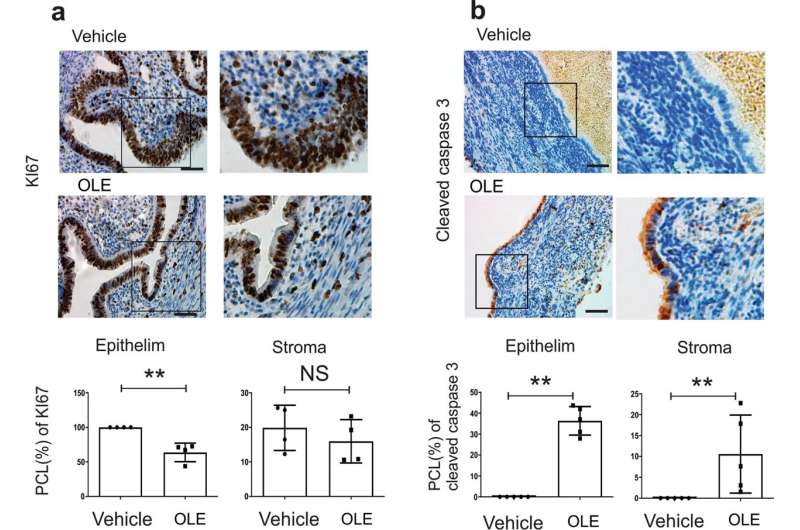Exploring a potential new treatment for endometriosis

Up to 15% of women of reproductive age in the United States suffer from endometriosis, a condition characterized by pelvic pain, menstrual cramps and infertility. Endometriosis develops when tissue like the lining on the inside of the womb grows outside of the uterus. This growth may swell and bleed, leading to pain and other symptoms.
"Endometriosis depends on estrogen, a hormone well known for regulating a woman's reproductive functions. Estrogen also affects other organs such as the heart and blood vessels, bones, breasts, skin, hair, mucous membranes, pelvic muscles and the brain," said corresponding author Dr. Sang Jun Han, associate professor of molecular and cellular biology and in the Center for Reproductive Medicine at Baylor College of Medicine.
Endometriosis' dependence on estrogen and inflammation has guided treatments that are based on systematically removing estrogen and using anti-inflammatory drugs. "However, current endometriosis treatments have low efficacy, high recurrence rate and cause adverse effects in other tissues affected by estrogen," said Han, who also is a member of Baylor's Dan L Duncan Comprehensive Cancer Center. "Our goal in this study published in the Journal of Biomedical Science was to look for a better treatment for this condition."
Since endometriosis is an estrogen-dependent disease, estrogen receptors (ERs) ER-alpha and ER-beta, which mediate the hormones' effects on cells, play essential roles in the development and progression of the condition. Previous work by the Han lab and others has shown that ER-beta contributes significantly to the progression of endometriosis.
"These findings suggest that selectively suppressing the activity of ER-beta could help treat the condition without side effects of current hormonal therapies targeting ER-alpha," said first author Dr. Yuri Park, a postdoctoral associate in the Department of Molecular and Cellular Biology at Baylor.
Working with cells in the lab, Han and his colleagues screened a library of natural products searching for compounds that could be used to treat endometriosis as non-hormonal therapies.
The team found that oleuropein, a natural component found in olive leaves, selectively inhibits ER-beta activity, but not ER-alpha activity, and effectively suppresses the growth of mouse and human endometriosis lesions in mouse models.
"In addition, oleuropein treatment was neither toxic to the liver nor did it affect the ability of female mice to have offspring," Han said. "In mice with endometriosis, oleuropein improved the pregnancy rate. We are excited by these promising findings as they support further exploration of the value of oleuropein as naturopathy for human endometriosis treatment. Oleuropein is less expensive than hormonal therapy, and our current findings suggest that it is safer than current treatments."
More information: Yuri Park et al, Oleuropein suppresses endometriosis progression and improves the fertility of mice with endometriosis, Journal of Biomedical Science (2022). DOI: 10.1186/s12929-022-00883-2




















